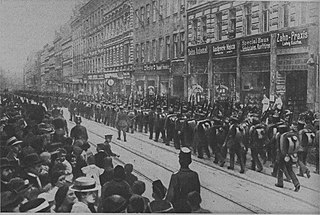 W
WThe Battle of Dogger Bank on 10 February 1916 was a naval engagement between the Kaiserliche Marine of the German Empire and the Royal Navy of the United Kingdom, during the First World War. Three German torpedo boat flotillas sortied into the North Sea and encountered the British 10th Mine-sweeping Flotilla near Dogger Bank. The German vessels eventually engaged the British vessels, after mistaking them for cruisers instead of minesweeping sloops. Knowing they were out-gunned, the British attempted to flee and in the chase, the sloop HMS Arabis was sunk, before the British squadron escaped. As the cruisers of the Harwich Force returned to port, the light cruiser HMS Arethusa struck a mine, ran aground and broke in two. Although the Germans were victorious, they inflated the victory by reporting that they had sunk two cruisers.
 W
WThe Blockade of Germany, or the Blockade of Europe, occurred from 1914 to 1919. It was a prolonged naval operation conducted by the Triple-Entente powers during and after World War I in an effort to restrict the maritime supply of goods to the Central Powers, which included Germany, Austria-Hungary and the Ottoman Empire. It is considered one of the key elements in the eventual Allied victory in the war. The German Board of Public Health in December 1918 claimed that 763,000 German civilians died from starvation and disease caused by the blockade up until the end of December 1918. An academic study done in 1928 put the death toll at 424,000. An additional 100,000 people may have died during the continuation blockade in 1919.
 W
WBetween 1916 and 1919, 464 officers and 6373 soldiers of the Greek Army's IV Army Corps were interned in the German city of Görlitz, officially as "guests" of the German Empire, for the duration of World War I. During August 1916, Bulgarian and German forces invaded the Greek territory of eastern Macedonia, ostensibly in order to confront the Allied troops who had established themselves in and around the northern Greek city of Thessaloniki. The Greek government had given its local forces strict orders not to oppose neither the Allies nor the Central Powers, in an attempt to preserve the country's neutrality during the conflict. However, contrary to German assurances that they would respect Greek sovereignty and civil authorities, the Bulgarians quickly made clear that they aimed to annex the territories they captured, and tried to isolate and capture the Greek troops of IV Corps piecemeal. To avoid Bulgarian captivity, the acting commander of the corps, Colonel Ioannis Hatzopoulos, asked the German authorities to accept moving his men to Germany for the duration of the war.
 W
WThe Battle of Jutland was a naval battle fought between Britain's Royal Navy Grand Fleet, under Admiral Sir John Jellicoe, and the Imperial German Navy's High Seas Fleet, under Vice-Admiral Reinhard Scheer, during the First World War. The battle unfolded in extensive manoeuvring and three main engagements, from 31 May to 1 June 1916, off the North Sea coast of Denmark's Jutland Peninsula. It was the largest naval battle and the only full-scale clash of battleships in that war. Jutland was the third fleet action between steel battleships, following the Battle of the Yellow Sea in 1904 and the decisive Battle of Tsushima in 1905, during the Russo-Japanese War. Jutland was the last major battle in world history fought primarily by battleships.
 W
WM2-class zeppelin LZ 32, given tactical number L 7, was a rigid airship operated by the Kaiserliche Marine, which flew 164 times, including 77 reconnaissance missions over the North Sea, with several unsuccessful attempts to attack English coastal towns. Brought down on 4 May 1916 by anti-aircraft fire from HMS Phaeton and HMS Galatea, she was destroyed by Royal Navy submarine HMS E31 off Horns Reef.
 W
WThe LZ 61 was a World War I German Navy airship, allocated the tactical numbering 'L 21'. It carried out a total of ten raids on England, and 17 reconnaissance missions.
 W
WThe Turnip Winter of 1916 to 1917 was a period of profound civilian hardship in Germany during World War I.
 W
W